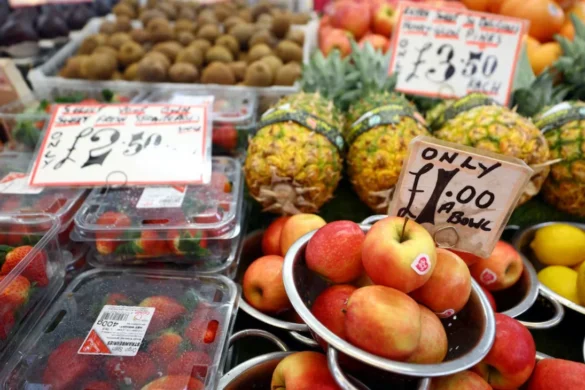Nigeria’s Consumer Price Index (CPI) rose to 22.79% in June from the 22.41% recoded in May 2023.
This is according to the latest CPI report released by the National Bureau of Statistic (NBS) on Monday.
The CPI measures the rate of change in prices of goods and services.
“In June 2023, the headline inflation rate rose to 22.79% relative to May 2023 headline inflation rate which was 22.41%. Looking at the movement, the June 2023 Headline inflation rate showed an increase of 0.38% points when compared to May 2023 headline inflation rate,” the Bureau stated.
The report also showed that food inflation spiked to 25.25% on a year-on-year basis which is higher than the 20.60% recorded in June 2022.
For the month under review, food prices rose to 2.40%, which is 0.21% points higher compared to the rate recorded in May 2023.
The year-on-year basis rate showed a 4.19% higher compared to the 18.60% rate recorded in June 2022.
“On a year-on-year basis, the Headline inflation rate was 4.19% points higher compared to the rate recorded in June 2022, which was 18.60%. This shows that the Headline inflation rate (year-on-year basis) increased in June 2023 when compared to the same month in the preceding year (i.e., June 2022).”
On July 13, 2023, President Bola Tinubu declared a state of emergency on food security in Nigeria.
The President directed that all matters pertaining to food and water availability and affordability, as essential livelihood items, be included within the purview of the National Security Council.
The directive was said to be in line with his administration’s position on ensuring that the most vulnerable are supported.
The President said he was not unmindful of the rising cost of food and its effect on the pocket of citizens.
The President also directed the immediate release fertilizers and grains to farmers and households to mitigate the effects of the subsidy removal.
“There must be an urgent synergy between the Ministry of Agriculture and the Ministry of Water Resources to ensure adequate irrigation of farmlands and to guarantee that food is produced all-year round.” the President was quoted as saying.
“We shall create and support a National Commodity Board that will review and continuously assess food prices as well as maintain a strategic food reserve that will be used as a price stabilisation mechanism for critical grains and other food items. Through this board, government will moderate spikes and dips in food prices.
“To achieve this, we have the following stakeholders on board to support the intervention effort of President Bola Ahmed Tinubu: The National Commodity Exchange (NCX), Seed Companies, National Seed Council and Research institutes, NIRSAL Microfinance Bank, Food Processing/ Agric Processing associations, private sector holders & Prime Anchors, small holder farmers, crop associations and Fertilizer producers, blenders and suppliers associations to mention a few.
“We will engage our security architecture to protect the farms and the farmers so that farmers can return to the farmlands without fear of attacks.”




